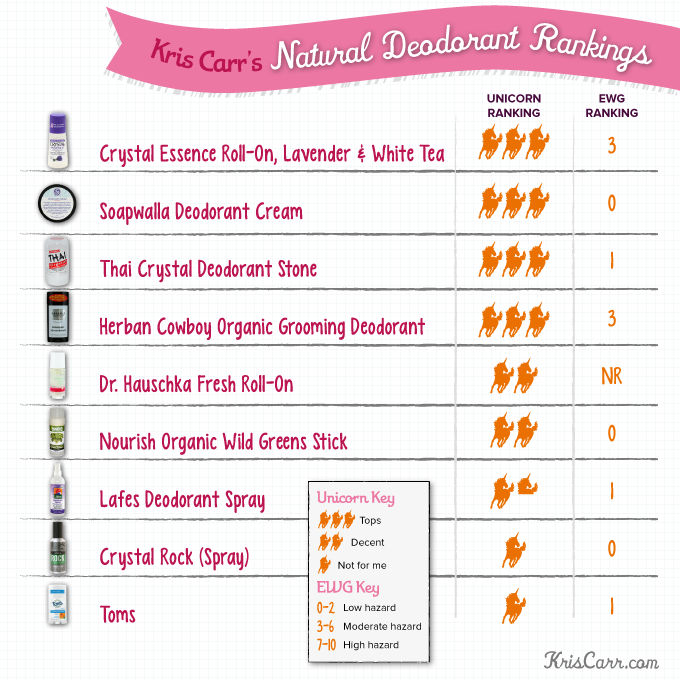Your skin is your body’s largest organ and it’s really good at absorbing what you put on it. Think about it like this: when smokers want to quit, they slap on a patch that delivers nicotine right to their bloodstream via their skin, same deal with the birth control patch. There are even vitamin B12 patches! With your spongy epidermis in mind, it’s important we do our best to reduce our chemical exposure. Which includes what we put on our pits. I can’t wait to discuss this all with you. Let’s dive in!
To clear up our stinkin’ thinkin’ about, well, stinkin’, here are a few starting points about deodorants, antiperspirants and good ole sweat:
- Why do we sweat? Sweating is our body’s cooling mechanism. We sweat when it’s hot out, when we’ve been exercising, when we have a fever or when we’re anxious and stressed.
- Why does it smell bad? Actually, sweat itself doesn’t smell. That signature sweaty odor comes from the meeting of the bacteria living on our skin with the sweat escaping from our sweat glands.
- What are antiperspirants? Some people try to prevent body odor by using an antiperspirant to stop their bodies from sweating (spooky!). Unfortunately, it’s unlikely that you’ll ever find a truly non-toxic anti-perspirant because of the harsh ingredients necessary to prevent sweating—more on this in a moment.
- What are deodorants? Unlike an antiperspirant, a deodorant works on top of the skin, killing off the bacteria with an antiseptic ingredient, then covering any leftover odors with a scent. As with all personal products, it’s important to be an informed consumer to select a safe deodorant. The good news is that it’s possible!
Conventional Deodorants & Antiperspirants
What should you be looking for when you check the ingredients on your next stick? Here are a few of the potentially harmful things found in regular deodorants and antiperspirants. These are the guys you want to avoid. Take note: Some of these ingredients will be spelled out right on the label, and some won’t be, so you might have to sleuth a little further.Talc
What does it do? Absorbent and colorant.
Why should you avoid it? It is considered a carcinogen if it contains asbesiform fibers. But there’s no way to know if the talc in your product contains asbestos. So stay away—better safe than sorry.
Triclosan
What does it do? Kills bacteria.
Why should you avoid it? Triclosan disrupts the endocrine and immune systems, can cause allergic reactions and can also build up in your tissues.
BHT
What does it do? Acts as a preservative.
Why should you avoid it? BHT can cause allergic reactions and has also been linked to cancer.
Propylene glycol
What does it do? Keep things from drying out. Propylene glycol is used in cars as an anti-freeze and in airplanes as a de-icer.
Why should you avoid it? It can irritate your skin (and gosh knows what else).
Parabens
What do they do? Used as a preservative, containing antibacterial and antifungal properties.
Why should you avoid them? Many parabens mimic estrogen in the body, and have been found inside breast cancer tumors. The widespread use of parabens in personal care products makes their potential link to cancer especially concerning. Most experts call for more research.
Fragrance
What does it do? This one is pretty straight forward: the synthetic chemicals listed as “fragrance” are included in products to mask body odor.
Why should you avoid it? There are an alarming number of chemicals (over 3100!) that fall into the fragrance category. According to the Environmental Working Group: “The average fragrance product tested contained 14 secret chemicals not listed on the label. Among them are chemicals associated with hormone disruption and allergic reactions, and many substances that have not been assessed for safety in personal care products.”
Phthalates
What do they do? These chemicals are called plasticizers—they make products more spreadable.
Why should you avoid them? Phthalates have been found to be endocrine disruptors (chemicals that can affect your hormones).
Aluminum Chlorohydrate
What does it do? Aluminum chlorohydrate is a salt that prevents wetness, which makes it a very popular ingredient in antiperspirants.
Why should you avoid it? The continued use of aluminum chlorohydrate adds to the number of chemicals your body must eliminate and to your overall body burden (see more below).
How do these chemicals impact your health?
As our friend Heather White, the Executive Director of Environmental Working Group, put it so clearly during our Chat & Chew, we just don’t know what the long term effects of the buildup of these chemicals are, and the things we do know are pretty alarming. When EWG studied body burden, (the amount of chemicals stored in our bodies), they found the average person has nearly 300 different chemicals in their system, including PCBs and DDT, which were banned over 30 YEARS AGO in the US.Natural Deodorants
But there’s good news! Lucky for us, there are natural ingredients that can be used in place of the chemicals. Remember that we all have different body chemistry. That’s why your best friend might swear by a certain brand, but that same formula might leave you wanting (and wafting). What works magic for me may or may not work for you.Disclaimer: Read your labels tootsies! When you test your own deodorants, keep in mind that not all natural deodorants are created equal. And just because a product says “natural” on the package doesn’t mean it’s all good in the hood. If you can find products that are certified organic (not always possible), that may be the best way to go, since the labeling has a more stringent standard than “natural.”

